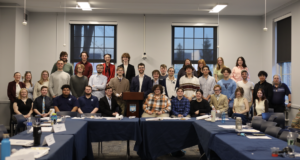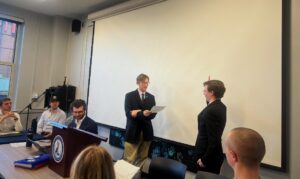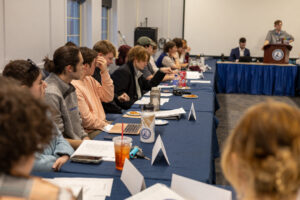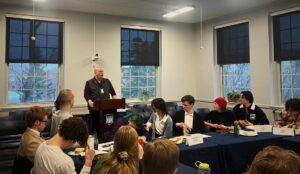On Monday, March 11, the board of trustees met at the University of Southern Maine to make the final vote regarding political speech activities on all University of Maine System (UMS) campuses. In a unanimous decision, the board voted to prohibit faculty from participating and engaging in partisan, political speech or activity on university grounds, as representatives of the university system.
UMaine, along with its six sister institutions around the state, has adopted the new policy, Section 214, regarding free and political speech after concerns were raised about the system’s political impartiality. As a flagship university that relies on taxpayer money and student tuition revenue from federal financial aid programs, UMaine adheres to certain policies to maintain its federal tax-exempt status.
Chief of Staff and General Counsel to the board Jim Thelen wrote in this regard, “The System and its universities have federal IRS 501(c)(3) tax exempt status, which legally requires that our institutions, and that our employees using university resources, not engage in partisan political activities. That’s already the law, and the policy’s statement on that is simply a restatement of what the law already requires.”
A draft of the newest board policy 214, “Institutional Authority on Political Matters,” works through the Section 212 policy of “Free Speech, Academic Freedom and Civility.” The policy explains, “The Board recognizes its faculty is subject matter experts in their areas of teaching and research and encourages them to responsibly disseminate their research and knowledge. This policy does not restrict any UMS faculty, staff, or student from speaking on political matters … provided that they do not represent that they speak for their campus or the System.”
Policy 212 on free and academic speech at UMaine was first put into effect in 1967, revised later in 1974 and again in 2017. According to this section of the UMS online policy manual, “System faculty and staff have the right to comment as employees on matters related to their professional duties… The Board of Trustees is committed to protecting the rights all University community members share to free speech, which includes free expression and assembly, as enshrined in the U.S. and Maine State Constitutions. There shall be no restriction at any System institutions on these fundamental rights… The University may also reasonably regulate the time, place, and manner of the exercise of these rights to preserve order for the System’s universities to function as institutions of higher learning.”
Some students and faculty worry that this policy will limit their ability to participate in free speech on campus, however. Brody Haverly-Johndro, current UMaine 2019 class president and president of the Maine College Democrats, said he agrees with student concerns. He wrote, “[I] have concerns that the Board of Trustees decision will impact the ability of the UMaine community to voice their political opinions in a respectful, constructive manner.”
Thelen argued that the policy had no intention of restricting free and political speech by students or faculty.
“Faculty have the same academic freedom to lead such discussions, and students have the same free speech rights to participate in such discussions, as they had before this policy was adopted. The policy does not restrict or apply to such discussions,” Thelen said.
On March 1, students participated in a sit-in during a board of trustees meeting in the Rudman Conference Room of Estabrooke Hall. According to the Facebook event created by the group, the demonstration was intended to raise student concerns.
Event host Kirsten Alex Daley wrote, “We are staging a sit in protest of the UMaine Board of Trustees meeting to demonstrate student and faculty concern about the new freedom of speech guidelines being suggested by the Board… We firmly believe that restricting political action of staff and faculty at UMaine will not only be a hindrance to student organizations that do political action and rely on help from faculty and staff but will also lead to attempts to silence political action at UMaine.”
Third-year international affairs student Ruben Torres expressed that the board should have made a stronger effort in attempting to inform the campus community about their decision. “… Yes as students we should be made aware but the board has made a good track record of doing what they want anyways and not actually listening to the students,” Torres said. “So I feel like at this point we might as well just get sent out an email saying ‘the board is going to do this’ instead of hiding behind the name of ‘vote’.”
The board of trustees student representative, Samuel Borer, stated that the decision has been underway for several months and mentioned that students were informed prior to the vote. “The policy has been public knowledge for many months and drafts of the proposed language has been publicly discussed in Board Committees as well as private conversations with Faculty Senates and the Student Representatives. There was a notion [that]… the Board of Trustees were doing this without consulting anyone and that is just simply not true. I reached out to students all over campus to get a collective and comprehensive look at the opinions of the Student Body,” Borer said.
Daley, a fourth-year anthropology student, stated that the board should have been more clear about their intentions. “I think the [board of trustees] could have chosen to simply put out an email about the vote and rule change, but instead they chose to stay with the current system of communication… their student reps. It isn’t enough to have two students informed if they aren’t finding effective ways to inform the student body,” Daley wrote.
While some students expressed concerns that they weren’t effectively prepared or made aware of the impending vote, the board disagreed. “The University of Maine System has been very transparent, including pushing back the vote two months to ensure there was enough time to get input. While there were requests to push the vote back again to May, and the request was not acted on, it cannot be overlooked that they did already push the vote back once to ensure they were able to consult faculty, students, and stakeholders,” Borer said.
Torres concluded, “[The policy is] meant to prevent association with the University which is federally and state funded. What is said/thought by students and faculty should not be representative of the university nor of the student government.”










